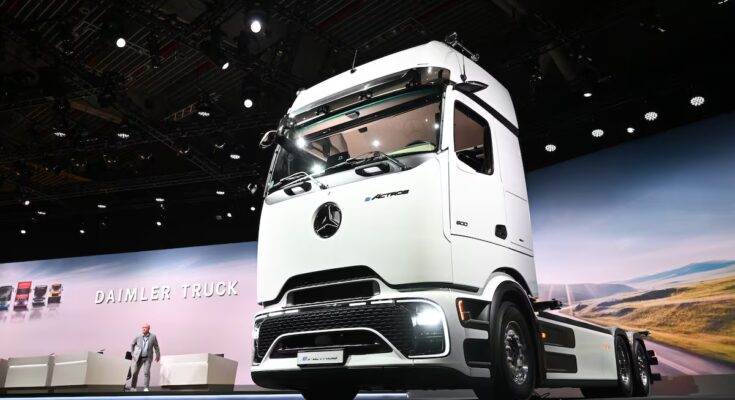If the number of lawyers accurately reflects the amount of money at stake, Daimler Truck (a truck arm that was spun off from Mercedes-Benz in 2022 to be listed separately on the stock exchange) and other accomplices of the former truck pricing cartel have reason to worry. Around 130 lawyers and their experts will gather in a conference room at the Munich trade fair on Monday for a week-long legal battle. The hearings are part of a series of legal disputes involving billions of euros in damages claims against companies including Volkswagen’s MAN, Volvo AB and Daimler.
Munich’s regional court has taken the unusual step of renting space to house plaintiffs and company lawyers, in what will be a crucial step in the delayed fallout from collusion in the medium and heavy truck sector more than a decade ago. “We are facing a crucial moment in the truck cartel litigation,” said Roman Mallmann, a trial lawyer at Freshfields in Düsseldorf, who represents Volvo in these cases. “Munich is the highlight,” he adds.
The litigation has quietly spooked Europe’s trucking industry for years, but has barely made it onto the mainstream agenda because it involves hundreds of lawsuits spread across multiple jurisdictions. Many of these cases have come together in Munich, where a single group of plaintiffs claims around 2 billion euros.
For most lawyers following the trial, the question is not whether the producers will have to pay – on top of the €3.8 billion in fines imposed on them by the European Commission almost a decade ago – but how much. According to industry information, the total charges and possible liabilities could amount to another 3.7 billion, but the risks could be greater. After MAN exposed the cartel, Daimler, DAF (owned by Paccar), Iveco and AB Volvo reached a settlement with European Union regulators in 2016, agreeing to pay 2.93 billion euros for price manipulation between 1997 and 2011. Scania – now also part of Volkswagen’s Traton truck unit – unsuccessfully contested the charges and was fined 880.5 million euros. euros a year later.
While MAN, one of the cartel’s biggest violators, was spared regulatory sanctions for speaking out, this leniency does not apply to the civil cases now underway. Truck buyers subsequently filed lawsuits in about 20 European countries and Israel to recover what they say had been overcharged. In Germany, which has become the center of the litigation, around 500 lawsuits have been filed. Other large clusters of lawsuits are found in the United Kingdom and the Netherlands. Around 100 cases are pending in Monaco and 36 of them were scheduled to be heard in November, for a total request of 500 million.
The ruling, expected next year, will likely affect cases across Germany, according to Sarah Milde Lodde, Munich-based antitrust partner at law firm Hengeler, which represents MAN. “The result in Munich will be of revolutionary importance,” he said. “Of course each court has to decide independently, but in reality many will turn to Monaco.”
After acquiring the owners’ claims and bringing them together, Financialright Claims GmbH is one of the main players. It filed its first lawsuit in 2017, covering 85,000 trucks and seeking more than 800 million euros. More lawsuits followed and Financialright says it is now claiming a total of around €2 billion, including interest, for the excessive prices of 200,000 vehicles. Disputes over the company’s right to represent claims were part of the slow process. While the German Supreme Court has given the concept the green light, the controversy continues, with a hearing on the Financialright case scheduled for December.
In addition to these litigation companies, delivery service DHL Group, state rail operator Deutsche Bahn AG and logistics companies such as the Dachser Group have also filed lawsuits against the truck manufacturers. The five days of hearings in the Wappenhalle of Munich’s Nazi-era convention center are expected to be a “battle of experts” as each side argues over the amount of the surcharge, said Alex Petrasincu, a trial lawyer at Düsseldorf-based Hausfeld, which represents logistics companies.
The battle to find out how much the surcharge was
The court tasked two economists from Germany’s prestigious Ifo institute with determining how much the trucks would have cost if manufacturers had not set prices, a complex calculation involving hypothetical models. This will be the key to the case and every percentage point counts. Sebastian Jungermann, a lawyer at Arnecke Sibeth Dabelstein in Frankfurt and a representative of Financialright, estimates that around ten million trucks were sold during the cartel period, but that probably less than half of the lawsuits are pending.
With a cost per truck estimated at around 70,000 euros and claims potentially amounting to four million trucks, according to Jungermann’s estimates, the potential damage could amount to 2.8 billion euros per percentage point of surcharge.
Although Financialright experts predict damages above 10%, few courts have published a figure. One of the first was the UK Competition Appeal Tribunal. In the cases brought by Royal Mail and BT, the surcharge was set at 5% of net prices. Spanish judges have adopted the same figure, as have courts in Berlin and Stuttgart. The German sentences have been appealed.
In Munich, truck manufacturers will try to reduce this figure to as close to zero as possible. Each side will bring its own experts to question those appointed by the court. The Munich judges sealed the experts’ conclusions, which differ between truck manufacturers and will only be made public during the hearings.
All have refused to reveal how many trucks they have sold as part of the cartel or what damage claims they face. However, disclosed financial information indicates that the outcome could be significant. Daimler declined to disclose a specific amount reserved for cartel cases, citing accounting rules, but said its total legal risks amounted to $1.6 billion. Price fixing cases are the only litigation explicitly mentioned by the company in its annual report. The German truck maker will continue to defend itself against unfounded accusations, a Daimler spokesman said.
Traton, the holding company of MAN and Scania, declared that in most cases no measures were recognized, hoping to win them. The company disclosed potential legal losses of $162 million in the trucking cases, but declined to provide details.
In 2024, Traton increased its total litigation provisions to $512 million, which includes claims for damages caused by the cartel, but also other litigation that the company did not specify in the annual report. AB Volvo said in its annual report that it faces 3,000 lawsuits, but claims its prices were not affected by the collusion. The manufacturer has reserved 6.6 billion Swedish crowns (598 million euros at the current exchange rate) until 2023 for those cases where the outcome is estimable, but added that the amount could change.
The Swedish company also recognized potential liabilities of SEK 4.9 billion for disputes with an uncertain outlook. This position includes trucking cartel lawsuits. The company declined to comment on the litigation beyond the report.
Although Iveco wrote in its annual report that it had recognized a cost of 32 million for lawsuits whose outcome was estimable, the company added that it had not set aside any specific provisions for litigation. Its auditor, Deloitte, said in the same document that this decision was one of two issues raised in its audit. The matter was discussed with the company’s executives and lawyers, which Deloitte deemed sufficient to resolve it.
Paccar reported that its DAF unit began resolving cases in 2023 and recorded a $600 million (around €521 million) charge that year. While DAF has been the most active in resolving claims, others have also reached out-of-court settlements. International Nyrt, from Hungarian logistics company Waberer, announced its fourth settlement in two years in June, without specifying the amount or which company will pay.
Traton’s Scania entered the case late because its challenge to the EU fine was resolved last year. That means it could still be exposed to new lawsuits, as customers generally have five years to file a lawsuit after the fine becomes final. It could also be held liable for claims against other cartel truck manufacturers. The German logistics industry association, BGL, announced a new, similar lawsuit against Scania in July. The case involves 15,000 trucks owned by 1,000 companies. Compensation of 86 million is requested.
Although the new Scania case will not be discussed at the Munich hearings, the companies’ lawyers will be following it closely and will have every reason to do so. The court in the Bavarian capital will determine the fate and future of these disputes, according to AB Volvo lawyer Mallmann.



